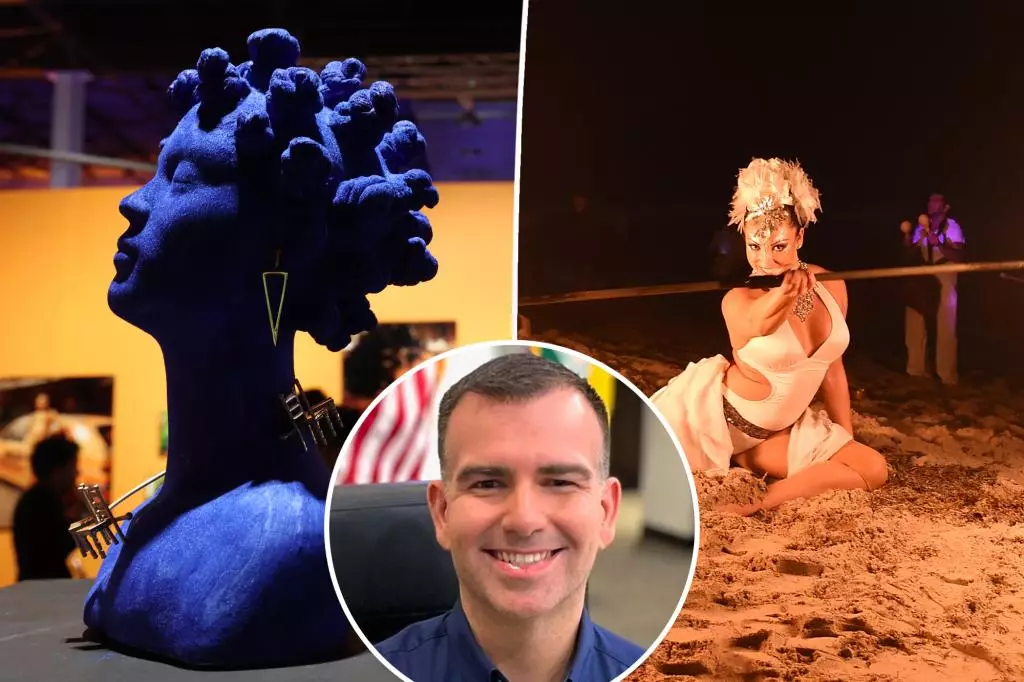Amid the vibrant backdrop of Miami Beach, infamous for its lavish nightlife and artistic showcase during Art Basel, a tumultuous clash between high society and local governance has emerged. Homeowners from the exclusive stretches of Palm, Star, and Hibiscus Islands are rallying against a newly implemented city ordinance targeting extravagant parties. At the forefront of this legal battle are three affluent residents: Leonard Hochstein, a prominent plastic surgeon and star of “Real Housewives of Miami,” Sinan Tuna, the CEO of cosmetics brand Farmasi, and Daniel Vincent Liburdi, an aficionado of high-profile gatherings. Together, they are seeking a temporary injunction against the city’s recent crackdown on large-scale commercial events, a move they argue stifles their freedom to celebrate and express their lifestyles.
The trio’s frustration stems from the city council’s resolution, passed on November 20, which mandates that parties featuring extensive setups—including dance floors, sound systems, and even fireworks—must secure permits to proceed. Those who flout the new requirements risk arrest, a provision that has rattled the affluent party organizers. They claim to have invested nearly $4 million in hosting these glamorous events, with Hochstein alone reportedly spending $300,000 and Tuna a staggering $1.7 million for his annual Art Week festivities.
Their legal representation, attorney Richard Wolfe, argues that these regulations contravene established procedural norms and fail to offer adequate notice to organizers accustomed to planning their lavish soirées. His assertion that the new law is perilously vague highlights a broader concern that Miami Beach’s famed gatherings could face abrupt cancellations, leaving hosts at the mercy of rapid regulatory changes. Wolfe’s dramatic portrayal of his clients facing arrests during their own celebrations underscores the tension brewing between the elite and city officials.
In stark contrast to the homeowners’ bemusement, Miami Beach Vice Mayor Alex Fernandez stands firm, emphasizing the need for responsible governance. He characterizes the lawsuit as an attempt to circumvent essential permits designed to maintain community standards and protect residents’ quality of life. Fernandez points to a history of complaints from local residents regarding noise and traffic generated by these half-baked commercial parties, which, he argues, have consistently disrupted neighborhood tranquility.
Moreover, the Vice Mayor has identified a critical concern regarding public safety. The congestion caused by these extravagant events, he asserts, often obstructs emergency vehicles, posing genuine risks to residents. Fernandez maintains that the city is open to hosting celebrations but insists they should only occur in venues that can accommodate large gatherings without compromising residents’ well-being. In this context, he advocates for a balanced coexistence of celebration and community respect.
As Miami Art Week approaches, tension escalates, particularly surrounding parties like Höchstine’s planned bash for a renowned magazine featuring special performances. With the potential for uninvited guests and chaos reminiscent of past events, the stakes are high for event organizers. The legal dispute has cast a shadow over the artists and party-goers who anticipate the vibrancy of the annual fair, amplifying the urgency for a resolution.
Fernandez adds a crucial angle in his critique of unauthorized gatherings, branding them as exploitative. He contends that these events do little more than prey on the prestige of Art Basel, tarnishing the reputation the fair has cultivated over the years. By leveraging this high-profile art week, unauthorized event organizers risk diluting the cultural richness that Miami Beach represents. The Vice Mayor’s stance illuminates the struggle between hedonistic extravagance and community integrity, prompting a crucial dialogue about the future of events tied to Miami’s cultural fabric.
As both sides prepare for a legal showdown, with a crucial hearing on the horizon, the outcome will likely have lasting implications for Miami Beach’s party scene. The cases at hand examine not just individual freedoms but also the responsibilities that come with hosting large-scale events in a community marked by its affluent residents. Will the glittering allure of extravagant celebrations withstand the weight of local governance, or will the call for order and community integrity prevail?
The evolving narrative surrounding these debates emphasizes an urgent need for dialogue between high society and local officials, with open communication channels crucial for ensuring that festivities can be celebrated responsibly. As the countdown to Art Basel continues, Miami Beach stands at a crossroads, searching for a balance that honors both its artistic legacy and the harmonious coexistence of its residents.

